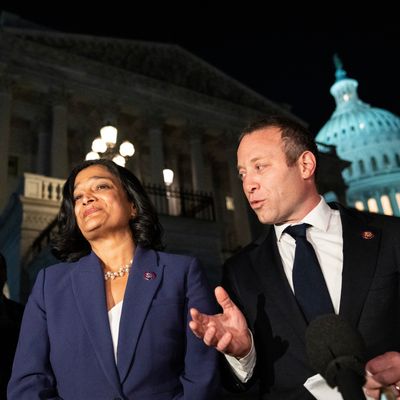
“The whole day was a clusterfuck.”
Those words, uttered by Wisconsin Democrat Mark Pocan to reporters Friday night, represented the most succinct assessment possible of a tortuous process that culminated in what will be one of the major legislative achievements of the Biden administration.
After months of party infighting, Democrats delivered their president a much-needed victory after Tuesday’s election thrashing and passed into law a prized $1 trillion bipartisan infrastructure bill. Joining almost all Democrats were about a dozen Republicans. What’s more, Democrats began debate on Biden’s $1.75 trillion Build Back Better social-spending bill. All of it required a day of back-and-forth negotiations among Democrats culminating with Biden addressing progressives via speakerphone in the midst of a marathon meeting of the most left-wing members of the House.
The votes came after months of blown deadlines and increasing tension between moderates and progressives within the Democratic caucus. “There were a lot of starts and fits and back-and-forths,” said Joaquin Castro of Texas.
Moderates had pushed to force a vote on the infrastructure bill ahead of the social-spending bill while progressives wanted the two to be linked. Progressives worried that without the leverage of the infrastructure bill, moderates would torpedo the social-spending bill. However, they were hamstrung by the fact that, for a long time, there was no social-spending bill. Democrats frantically tried to craft legislation that would meet the approval of two key Senate moderates, Joe Manchin of West Virginia and Kyrsten Sinema of Arizona. Even after a framework for the social spending was crafted in an attempt to meet their demands last week, the two refused to commit to supporting it.
Without their buy-in, the new plan was to draft a social-spending bill that could get 218 Democrats to support it in the House and pass that along with the infrastructure bill. Then, in the Senate it could be amended into whatever form necessary to meet the demands of the two recalcitrant Democrats. However, even that proved to be a bridge too far.
A handful of House moderates refused to vote for the social-spending bill without its cost being scored by the Congressional Budget Office. Many Democrats grumbled that it was not an effort made in good faith and that the need for a technical assessment of whether the legislation would be budget neutral was, at best, a stalling tactic. As Democratic leadership tried to twist arms, they left a procedural vote open for seven hours, setting the record for the longest vote in the 232-year history of the chamber. They couldn’t do it.
Then desperate to salvage something, Democrats tried to advance a compromise. They would advance the social-spending bill procedurally without actually passing it while finally approving the infrastructure bill. This proved a tough sell for progressives. For hours they met while trying to work out some sort of deal. Members of the Progressive Caucus shuttled in and out of a room while pizza was delivered and reporters hovered along with Joyce Beatty, the chair of the Congressional Black Caucus, who was left waiting outside the room for over an hour before she finally addressed progressives.
Eventually a mutual release of hostages was negotiated. Progressives would back the infrastructure bill and, in return, five moderates pledged to support the social-spending bill once the CBO score is out. That deal was sealed in a brief news conference held outside between Pramila Jayapal, the leader of the Progressive Caucus, and Josh Gottheimer, who had become the public face of moderate skeptics.
Then, finally, after months of turmoil and tribulation, the infrastructure bill was finally voted on. Members eagerly watched the electronic display of votes in the House chamber, staring intently to see the latest Republican to break ranks and vote yes with a green Y displayed next to their names. Eventually 13 did, fewer than the 19 Republicans who supported the legislation in the Senate but more than enough to counteract the opposition of the six left-wing Democrats who voted no.
When the bill finally cleared the 218 majority threshold needed to pass, Democrats broke out into a round of applause for Pelosi, who clasped hands in a quasi high five with Minnesota Democrat Dean Phillips. It seemed, at least for a moment, that the tension hanging over House Democrats for months had dissipated.
Afterward, Pocan told Intelligencer that the entire exercise had somehow eased tensions among House Democrats: “I think today really coalesced everything.” The Wisconsin progressive said it helped Democrats in both factions realize that they were actually “on the same page.” In his view, a lot of the tensions in past weeks had been “a lot of people talking past each other and not realizing where everyone stood.”
But as much as progressives took a leap of faith with their moderate colleagues, they ultimately have put their trust in Manchin and Sinema for the social-spending bill to become law. They’ve given up whatever remaining leverage that the infrastructure bill provided and now simply have to hope that Biden and the White House can deliver the necessary votes in the Senate. But, after months of trying and failing, they at least have finally started that process.





























